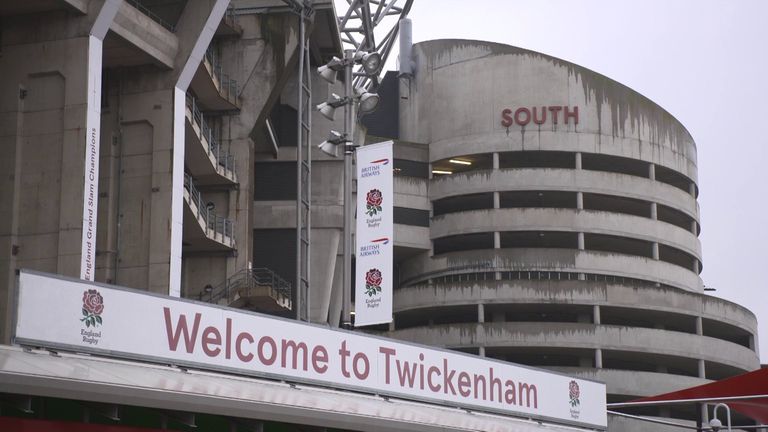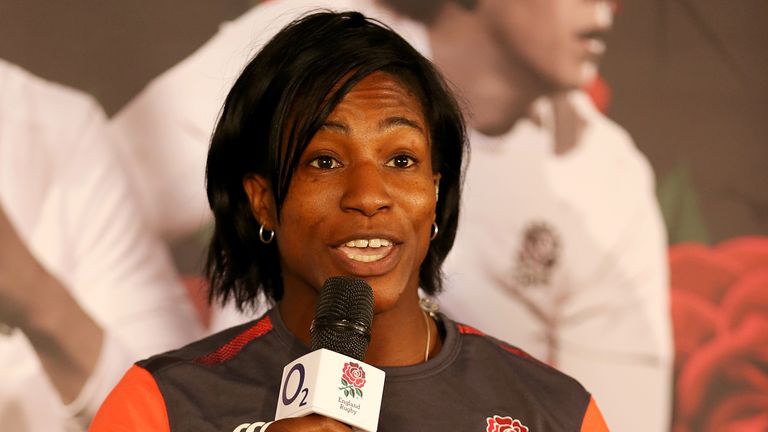Martin Offiah hopes Swing Low, Sweet Chariot review helps fans have 'stronger affinity' with 'BAME players'
Offiah: "I don't think the song needs to be banned. I just think we are singing it with an enlightened view. Maybe we will have a stronger affinity with the BAME players who are playing the game on the field"
Friday 19 June 2020 20:38, UK
Martin Offiah is hopeful a review by the Rugby Football Union into the historical context of 'Swing Low, Sweet Chariot' can help generations of supporters have a "stronger affinity" with BAME rugby players.
Amid the growth in support for the Black Lives Matter movement, the RFU is determined to "grow awareness" of the African American spiritual, which has become an anthem of English rugby over many decades.
The song is believed to have its roots in American slavery, with its credited author being Wallace Willis - a freed slave from 19th century Oklahoma.
Offiah can only learned this year the song came to prominence at Twickenham in 1987, when he played in the Middlesex Sevens tournament.
The former dual-code player, whose nickname was "Chariots", a pun on the title of the 1981 film Chariots of Fire, has praised the RFU's decision to create increased discussion and education and said to ban the song could be "divisive".
"I am learning that I am part of the history of the song and I am proud of that fact," Offiah told Sky Sports News.
"I have had a lot worse things sung at me back in the early and late 1980s playing rugby union and rugby league, rather than 'Swing Low, Sweet Chariot'.
"I have come through that and I am sure we as a community will come through this. It is all about educating.
"I don't think the song needs to be banned. I just think we are singing it with an enlightened view. Maybe we will have a stronger affinity with the BAME players who are playing the game on the field.
"With knowledge and education only good things can come off the back of that."
It was long believed the use of the song at English rugby matches stemmed from a 1988 game between England and Ireland, when a group of schoolboys from Douai School began singing it to the black player Chris Oti after he scored a hat-trick.
Former England international Brian Moore has said he "hates" 'Swing Low, Sweet Chariot' and questioned why it became so popular among spectators.
"It can go for me; I hate it," he wrote on Twitter.
"This was sung in rugby clubs when I was still a colt and well before Martin Offiah and Chris Oti played senior rugby.
"It was sung because of the rude gestures that went with it and without any thought of its origins. The world has moved on and, rightly, things that were normal then should not necessarily be normal now.
"Had today's context be known then it might not have been sung. Amongst other reasons for the RFU encouraging people not to sing it, one of the main ones is that most people only know two verses and it's crap as a national song because it has no relevance to England.
"It should be celebrated in its rightful context."
Former England rugby player Maggie Alphonsi admitted to Sky Sports News the song does not "sit easy" with her, but did not call for it to be banned.
Meanwhile, Offiah says he continues to receive apologies from fans on social media for racist remarks made towards him in previous decades and is encouraged that society is improving in its condemnation.
"People are becoming more self-aware and self-conscious as individuals, as institutions, as communities and as the human race," he said.
"It is about having these frank conversations about our past and sometimes we haven't wanted to have those conversations and people have been insensitive about having those conversations. It has caused people to be abrasive and aggressive and not really want to address it.
"Sometimes it is hard to look at ourselves as a sport and as individuals to look in the mirror."




